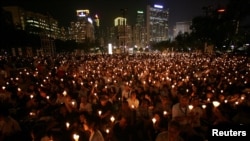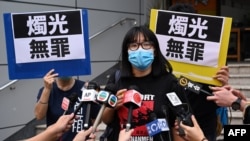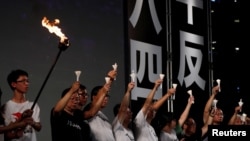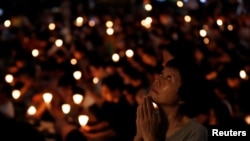Three former members of a disbanded Hong Kong group that had for 30 years organized annual vigils to commemorate China’s 1989 Tiananmen Square crackdown were convicted Saturday of failing to comply with a national security police investigation.
Chow Hang-tung, 38, a human rights lawyer and former vice-chairperson of the Hong Kong Alliance in Support of Patriotic Democratic Movements in China, and two committee members, Tang Ngok Kwan and Tsui Hon Kwong, were found guilty by the West Kowloon Magistrates' Court of failing to submit information to national security police.
The group has refused to hand over information including the personal details of its staff, its assets and sources of income, and the minutes of some of its meetings, according to public broadcaster RTHK.
Instead, the group handed over a letter explaining their refusal to cooperate and police officers later arrested five members of the alliance's standing committee, including Chow.
Rally drew tens of thousands annually
The group was the main organizer of Hong Kong's annual June 4 candlelight vigil for those who died in the 1989 military crackdown on the Tiananmen pro-democracy movement. For 30 years, the rally drew tens of thousands of mourners annually and the iconic sea of candles in Victoria Park marked Hong Kong as the only place on Chinese soil that could legally hold the commemoration.
Since the massive, sometimes violent pro-democracy protests in 2019, the Hong Kong government has banned the rally, citing restrictions due to COVID-19. Weeks before the national security law took effect on June 30, 2020, thousands defied a police order to hold what became the last rally and several veteran pro-democracy activists were later jailed for taking part in or inciting others to participate in the vigil.
On June 4, 2021, the 32nd anniversary of the Tiananmen protests, Chow was arrested and accused of promoting an unauthorized assembly after she used social media to urge Hong Kongers to commemorate privately by "turning on the lights wherever you are — on your phone, candles or electronic candles."
In September 2021, Chow, the alliance’s chairperson Lee Cheuk-yan, and vice-chairperson Albert Ho were charged with subversion under the national security law and the Alliance was accused by government prosecutors of working as a foreign agent after allegedly receiving HK$20,000 ($2,547) from an unnamed group. Chow contested the accusation in court, saying the alliance was an independent civil society group run by Hong Kongers, and that the case against her and the others amounted to "political persecution."
Chow has served two prison terms for unlawful assembly in connection with the Tiananmen commemorations. A longer sentence is expected for the graver charge of subverting state power through the Alliance. The Alliance disbanded in September 2021 after the arrests.
"If those in power had wished to kill the movement with prosecution and imprisonment, they shall be sorely disappointed," Chow said at a trial in December 2021. "Indeed, what they have done is breathe new life into the movement, rallying a new generation to this long struggle for truth, justice and democracy."
Magistrate Peter Law, hand-picked to hear national security cases by Hong Kong's Beijing-backed leader, said in a written judgment Saturday that it was necessary for the police to "ascertain the background" of the group given its political activities and "nexus of interactions with local and non-local organizations and people," according to Reuters.
"Some agents are even hidden, so a comprehensive searching and screening exercise is necessary," Law reportedly said.
Sentencing is expected on March 11 with a maximum jail term of six months for this offense.
New law imposes severe penalties
The national security law, which China imposed on Hong Kong in June 2020 after months of anti-government protests, punishes acts of secession, subversion, terrorism and collusion with foreign forces, with penalties as severe as life in prison. It has been widely criticized by rights groups and Western governments for crushing Hong Kong’s previous robust civil liberties, although China insisted that the law was necessary to restore order.
Chow and her colleagues’ conviction Saturday came one day before the official opening of China’s annual parliament, which will usher in a sweeping organizational overhaul that will bolster the Communist Party’s control and the biggest government reshuffle in a decade.
In a news conference, Wang Chao, the spokesperson for the National People’s Congress, said Hong Kong is now “back on the right track” thanks to the national security law.
Wang credited the controversial law for “protecting national security effectively and rapidly restoring social order” and “manifesting the rule of law.”
“Hong Kong residents’ rights and freedoms are better protected, and the situation has progressed from chaos to governance,” he said. “The formulation and enactment of the national security law is an important milestone in the implementation of the ‘One Country, Two Systems’ (policy).”







